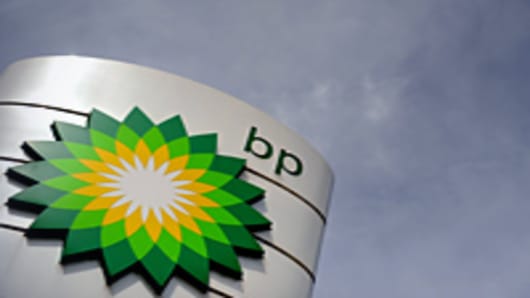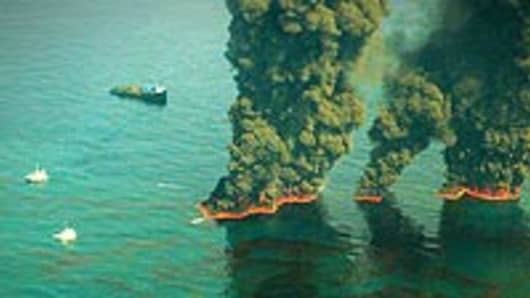Two years after the Deepwater Horizon explosion that resulted in a record-setting 4.9 million barrels of oil spewing out into the Gulf of Mexico, BP has its eyes on the future.
This year, the company is promising investors it's ready to shift back to expanding its oil production and building financial momentum.
“2012 will be a year of milestone delivery,” BP CEO Bob Dudley exclaims in the company’s most recent annual report released in March. “You can expect high-margin production coming back on stream, major project start-ups and new exploration wells, further progress on our divestment programme.”
Analysts say BP’s recovery since the start of the crisis, has put the oil exploration firm in a good position to deliver on those promises this year.
The stock fell from a high of $60.48 on April 20, 2010 — its market cap at that time stood at $189 billion. The stock bottomed at $27.02 in June of that same year, when its market cap stood at $84.6 billion. But, the stock has since crept back up and now is over $40, with a market cap value of $134.7 billion.
Since Dudley was elevated to the chief executive position during the height of the crisis in July 2010, the firm has sold off more than $20 billion in assets to help meet spill clean-up costs in the Gulf and funding obligations for the $20 billion Gulf Spill Oil Fund, returned to profitability and resumed paying dividends last year — after posting nearly $4 billion in losses in 2010.
“BP for the past six months has definitely been playing more offense,” says Pavel Molchanov, energy analyst at Raymond James . “They raised the dividend, they increased the capital spending program, and most visibly, BP now has five rigs operating in the Gulf of Mexico with a target of eight by the end of the year.”
Molchanov says two years after some had written the company’s obituary, BP has more than proven the skeptics wrong. While its oil and gas production levels remain 10 percent below pre-crisis levels, it is poised to make up a lot of ground. BP has not only resumed deep-water drilling in the Gulf of Mexico, in the last year it also secured more than 50 new drilling licenses in nine countries.
"What that tells us is this company is being treated like any normal multinational oil & gas producer the world over," he says.
Oppenheimer analyst Fadel Gheit says BP has managed the recovery well, but sustained oil prices above $100 a barrel have also played a big role in the company's return to profitability 18 months after the Deepwater Horizon explosion.
"When it happened, oil prices were in the 60s,” Gheit says. "Oil prices have averaged $120 for Brent over the last five months, so that helps a lot."
RISKS: LITIGATION OVERHANG
Morningstar analyst Steven Simko says sustained high oil prices are key to BP’s plans this year when it comes to settling its litigation issues, which remain the biggest uncertainty for the company.
BP expects that it will complete the final payments in the $20 billion Deepwater Gulf trust fund this year, freeing up funds for further expansion in exploration, but Simko is circumspect.
"I think BP management is a little optimistic in calling 2012 the end," he says. "If Brent were to fall by any material amount, they might need to sell more assets. Their funding issues could start to pick up again."
Oppenheimer’s Fadel Gheit says the company’s $7.8 billion settlement reached this month with the private plaintiffs groups should mitigate some of the litigation risk which has weighed on the stock. If the settlement is finalized as proposed, the payout would come from money already set aside in the Gulf trust.
"BP so far has been right on the money, in terms of estimating the total cost,” Gheit says of the $37 billion the company has set aside for current and future payments to meet its Deepwater liabilities, but government fines remain a big question mark.
The U.S. department of justice is suing BP for violating pollution laws. The government has estimated 4.9 million barrels of oil were spilled during the 100 days it took to cap and then kill the ruptured Macondo well in 2010.
Under the federal Clean Water Act the company faces civil penalties of at least $1,100 per barrel, and up to $4,300 per barrel if the company is found to have been negligent.
“If we take the lowest end of the penalty, that's what BP has already reserved for,” said Gheit, but the higher penalty could hamper the company’s recovery. “That will take this penalty to seventeen, eighteen or even twenty billion dollars."
Gheit points out some of the costs will be born by BP’s minority partner in the ill-fated well, Andarko Petroleum. Transocean , the owner and operator of the Deepwater Horizon drilling rig, could also bear some of the cost. A federal judge ruled last month Andarko is subject to the oil pollution violation as co-owner of the well, but did not resolve whether the driller will ultimately be held liable as well.
Investing in BP: Risk vs. Value?
INVESTING IN BP: RISK VS. VALUE?
Raymond James analyst Pavel Molchanov believes BP will work hard to try to reach a settlement with the government, most likely offering to pay more than the minimum fine in order to resolve the uncertainty that keeps its stock trading at a discount to its peers.
“If they come out soon with a settlement on the DOJ front, that would definitely help,” he said, referring to the suit by the Department of Justice.
While the risk remains the case could go to trial, Molchanov believes it’s unlikely, and because of that he thinks the risk overhang in BP shares offers investors a deep value opportunity right now.
“I would argue that its risk profile is just as low as Exxon’s. Exxon is not a risky stock and I don't think BP is, either," he exclaimed.
Morningstar’s Stephen Simko agrees there is a bull case to be made for BP shares, saying high oil prices will drive earnings, but he’s not a committed bull just yet. “A company like Exxon or Shell, from funding perspective, is in a stronger state,” he said.
Beyond the Deepwater Horizon overhang, Simko is concerned about ongoing risks associated with BP’s Russian joint venture THK-BP.
BP’s Russian oil production is the one area of the firm’s business that continued to grow over the last two years, to 856 thousand barrels a day at the end of 2011. It represents a quarter of the company’s energy production and profits, but also a source of big headaches.
“The company lacks the ability to control strategic investment decisions,” Simko wrote in a recent research report, noting that last year, a group of Russian stakeholders in the joint venture blocked BP’s proposed $18 billion Arctic exploration deal with state-owned Rosneft.
“The political risks here are significant," he added.
But Oppenheimer’s Fadel Gheit says BP isn’t the only one navigating political minefields. It’s a given for all of the commercial oil exploration companies.
“Unfortunately, politics rule everywhere,” he said.
Follow Bertha Coombs on Twitter: @coombscnbc
Questions? Comments? Email us at marketinsider@cnbc.com




